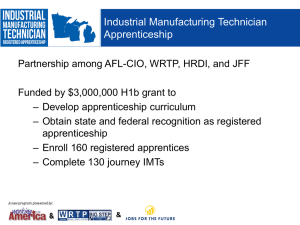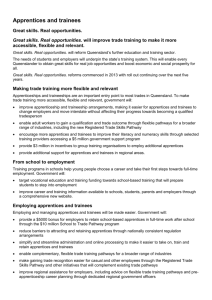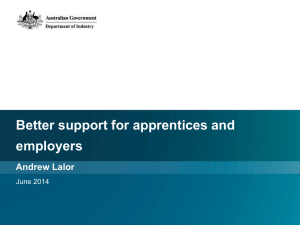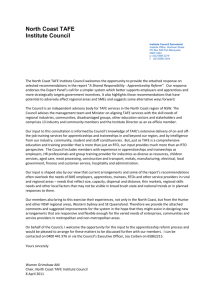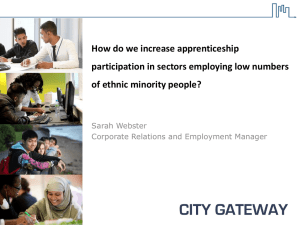HairBeautyAustraliaLtd - Australian Apprenticeships
advertisement
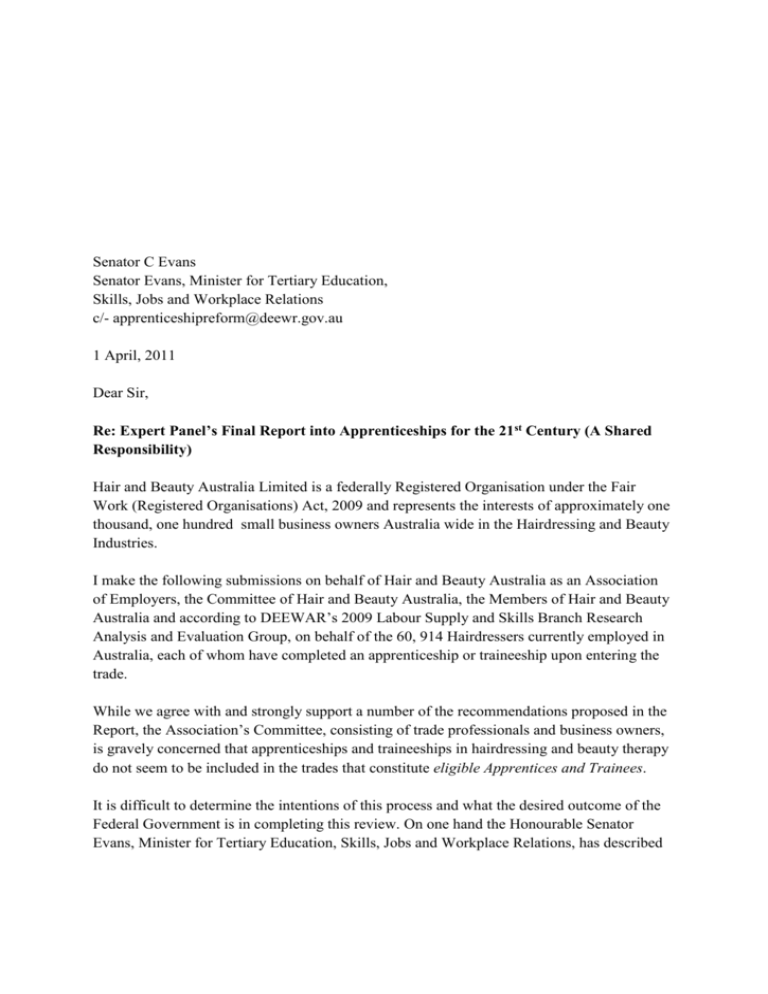
Senator C Evans Senator Evans, Minister for Tertiary Education, Skills, Jobs and Workplace Relations c/- apprenticeshipreform@deewr.gov.au 1 April, 2011 Dear Sir, Re: Expert Panel’s Final Report into Apprenticeships for the 21st Century (A Shared Responsibility) Hair and Beauty Australia Limited is a federally Registered Organisation under the Fair Work (Registered Organisations) Act, 2009 and represents the interests of approximately one thousand, one hundred small business owners Australia wide in the Hairdressing and Beauty Industries. I make the following submissions on behalf of Hair and Beauty Australia as an Association of Employers, the Committee of Hair and Beauty Australia, the Members of Hair and Beauty Australia and according to DEEWAR’s 2009 Labour Supply and Skills Branch Research Analysis and Evaluation Group, on behalf of the 60, 914 Hairdressers currently employed in Australia, each of whom have completed an apprenticeship or traineeship upon entering the trade. While we agree with and strongly support a number of the recommendations proposed in the Report, the Association’s Committee, consisting of trade professionals and business owners, is gravely concerned that apprenticeships and traineeships in hairdressing and beauty therapy do not seem to be included in the trades that constitute eligible Apprentices and Trainees. It is difficult to determine the intentions of this process and what the desired outcome of the Federal Government is in completing this review. On one hand the Honourable Senator Evans, Minister for Tertiary Education, Skills, Jobs and Workplace Relations, has described the objective of these undertakings to be successful in creating a “… simplified and nationally consistent system which provides relevant, quality training on and off the job” and on the other hand, recommendation five provides that the “… Australian Government support should focus on occupations that have tangible and enduring value for the economy”. The question we find ourselves asking is whether the Government is attempting to produce a consistently skilled economy or a consistently skilled workforce? We note the difference as being that a skilled economy is one in which the industries, and indeed the workers in those industries, which produce the bulk of Australia’s financial achievements, are qualified in some form of tertiary education and training, whereas, a skilled workforce is one where all workers are qualified in some form of tertiary education or training, whether their particular industry is a major contributor of wealth to the Australian economy or not. From the list of eligible Apprentices and Trainees it is clear that the recommendations delivered are focused on producing benefits for those trades that make a greater financial contribution to Australia’s GDP based on the industry they are involved in such as mining and also those trades or qualifications that attract controversial political attention due to shortages such as health and community service. On that basis, it can be inferred that the objective of this research project and its subsequent recommendations is to invest in the qualifications that are likely to result in a higher return on investment to the Australian Economy. We of course have no objection to this in principle, as long as it does not arrive as a result of disadvantaging other trades and qualifications such as those in the services industries and notably, from our own perspective, those in the hairdressing and beauty industries. As with many industries, Hairdressing in particular is facing a new generation of qualified practitioners that have been stupefied by the lack of quality on the job training throughout their apprenticeships and traineeships and by what in many circumstances is a lackadaisical approach to assessment of their competency in order to receive their final qualification. This, we believe from anecdotal evidence is the direct result of three issues. The first is the number of registered training organisations, particularly private organisations, which have the sole aim of producing profits and subsequently, are turning out students that have shown nowhere near the required aptitude to be considered as a qualified senior Hairdresser based on the competencies expected to be achieved under the relevant training packages. Often these apprentices and trainees require up to twelve months of direct supervision beyond the completion of their qualifications when they reach Salons in order to further develop their skills to the point where they can operate unsupervised. This is not to say that the RTO’s are the only blameworthy party, or that all RTO’s are focused on revenue rather than results, there are certainly some fantastic providers both public and private, specialising in our industry that not only raise the reputation and standards of individual students, but also set the foundations of producing a more skilled and professional industry and these RTO’s have the full support of our Association. The second issue is the lack of quality on the job training being provided by employers and the lack of support provided to those employers on how to deliver quality and structured on the job practical training for apprentices and trainees throughout the entire term of their training period up to the completion of their qualification. Too often employers, pressed by time and financial constraints (particularly in the Hairdressing Industry where most salons employ an average of only four staff and often one of those staff is an apprentice) are failing to invest the required time and resources into apprentices and specifically new apprentices, in order to ensure they are attaining the expected competencies outlined in both the individuals training plan and the curriculum of the training package. While the notion of competency based progressions and assessments have had the correct intention of ensuring that an Apprentice’s time in practical work is spent learning the skills of their trade, the days of Apprentices being asked to sweep floors and make coffees for clients are certainly not over. We are confident that this is not only an issue that Hairdressing and Beauty students face but those across the spectrum of service industries. Just as our first year apprentices are answering phone calls and preparing trays for senior stylists, we are in no doubt that first year commercial cookery students spend any number of hours peeling vegetables for their chef de cuisines as do retail trainees counting stock in back store rooms for their managers. Unfortunately, this time of “learning the ropes” as it is so often justified by employers, is more commonly than not included in their nominal training period rather than an extension of their training period. This means that what once was a four year apprenticeship is now a three year apprenticeship which can be completed in as little as twenty four months, a number of months of which is regularly spent without the apprentice ever performing a treatment on a client other than perhaps to wash their hair. In order to prevent these situations occurring, the services industries, just as much as those “occupations that have a tangible and enduring value for the economy”, require the structured support for employers to provide high quality development experiences for their employees. It is for these reasons that we are strongly in favour of recommendations three and four of the Report, but again would desperately like to see the range of eligible apprentices and trainees to be extended to the services industries. The third issue is the apparent disregard or lack of understanding by some employers and some RTOs of the assessment of competency process. We believe that this is inherently linked to the way that incentives are paid to employers and apprentices and trainees and needs to be reviewed as a part of this process. From circumstantial experience, our own Industrial Relations Advice Line regularly fields enquiries from employers who have the intention of ‘signing off’ apprentices before their nominal completion date for an early completion and would like to know what steps are required to make this happen. Upon further investigation, our advisors regularly divulge that the employer is not attempting to confirm the apprentice’s early completion based on the successful attainment of all of the required competencies, but is more often prepared to sign them off as an apprentices because either: The apprentice is not producing the required revenue in client services and retail sales in order to justify their continued salary so the Employer signs them off to end their employment at the end of the training contract; or The apprentice has shown signs of disobedience or underperformance and rather than taking disciplinary action to manage the employee’s performance they chose to sign the apprentice off and therefore end their training contract and employment; or The employer is experiencing cash flow problems and agrees with the employee to sign them off for early completion in order to free up funds and to receive the completion incentive payment. To combat this issue, we would suggest that in addition to recommendation three of the Report in establishing a prequalification and accreditation process for employers, upon the due completion of an apprentice or trainee, that the candidate undergoes a practical trade skills test to be assessed by an independent assessor (for example another employer who has completed the prequalification accreditation process) to ensure the standard of competence achieved is equivalent or greater than the prescribed outcomes of the training plan and package. If the candidate successfully passes the trade skills assessment then the employer will remain entitled to the completion incentive payment. However, if the candidate is not independently assessed as competent, it would then remain the responsibility of the employer to provide further training to the candidate in order to ensure the required competency level is achieved before the candidate can be signed off as completed and before the employer receives the completion incentive. Of course these submissions are made in consideration of those Employers and RTOs who do not participate in the training of apprentices and trainees correctly and luckily, not all employers or RTO’s require regulation to do the right thing. But as has been outlined in the report it is difficult to create a “one size fits all” approach to standardising the delivery of qualifications, support and incentives. We cannot stress enough, the importance and necessity of the service industries being included in these reforms but whether they are included as eligible apprentices and trainees or not, there are a number of additional points we would like to raise for consideration based on the recommendations provided in the Report. The Expert Panel promotes the notion of Shared Responsibility between RTOs and Employers. As an Industry Association we can certainly see the benefits in this ideology and support the promotion of mutual involvement in delivery and facilitation of an apprentice’s or trainee’s qualification. We believe to further streamline the process and release further government funding which could then be directly spent on the training of employers and students, that the involvement of Australian Apprenticeship Centres should be reviewed to assess their relevance in the process. Again, based on the feedback from our members, although almost every new employee is signed up as an apprentice or trainee in our industry, very few employers report having an significant relationship with the RTO their employee’s attend or the Australian Apprenticeship Centre – beyond the initial indenture process or to organise the paperwork for cancellations or completions. This has resulted in a situation where the employer and RTO are so far removed that there is very little contact directly between the two parties throughout the candidates qualification and subsequently very little buy in from employers into the student’s training plan and vice versa, very little buy in from the RTO into the student’s employment. We propose that the Federal Government review this process and suggest that potentially a more streamlined, and more involved process would be to have the RTO indenture the Employee as an Apprentice or Trainee themselves. This would ensure that from the outset of the candidate commencing their qualification and employment, a relationship is established between the RTO and Employer. It is likely that each of the stakeholders would then be more likely to communicate on a regular basis and engage in the Candidate’s training plan and progression. It would also ensure that the Apprentice or Trainee is aware that the two parties are involved and do communicate with each other and would hopefully result in improved performance of the apprentice or trainee and a lowering of non-completion rates as any issues that arise, either while studying or at work, can be addressed in a more timely manner and consequently will hopefully provide a resolution to the issue before the apprentice or trainee decides to terminate their training. With regard to the Employer Contribution Scheme, again while we recognised that the funding for such projects must come from somewhere and are not entirely opposed to a cocontribution by employers we would recommend that such an initiative be subject to the means testing of company revenue with a minimum threshold in place to determine which employers would be required to participate in the co-contribution scheme. As has been indicated throughout these submissions, the average salon operates anywhere between a 30% profit and a negative profit percentage each year. To avoid the industry, and others like it being completely dilapidated we propose the application of means testing to ensure that companies who simply can’t afford to co-contribute are not penalised, as this would only result in a complete stoppage of apprentices being employed in such businesses. Finally, Hair and Beauty Australia unequivocally supports recommendation number fourteen to review the interaction between Modern Awards and the Fair Work Act and their implications for apprentices and trainees. As it currently stands there is very little incentive for student, in particular those who begin pre-apprenticeships or school based traineeships while completing high school to go on and enrol in a full apprenticeship or traineeship post their graduation from secondary school. For example; under the Hair and Beauty Modern Award (MA00005) a school based trainee enrolled in Hairdressing in NSW is currently paid a base rate of $8.92 per hour in year 11 and $9.28 in year twelve. Should they then elect to complete an apprenticeship beyond the school based traineeship as a first year apprentice they would receive $6.78 per hour for the first three month, $7.19 per hour for the remainder of the first year and $9.60 for their second year as an apprentice. Why it is expected that a potential apprentice would agree to a lower rate of pay despite their experience over the previous two years is quizzical. On behalf of Hair and Beauty Australia, our Members and the Industry, we strongly request your thoughtful consideration of the inclusion of the services industries and Hair and Beauty industries in these reforms. Our industry is currently struggling to meet the continued demands and challenges that small businesses face. As with any company facing financial constraints, often the first costs to be cut are those of training. There is absolutely no doubt that without reform and continued Government support and mentoring both for employers and employees, the industry will see a steady decline in the number of new sign-ups for recognised apprenticeships and traineeships and will eventually result in the either the collapse of an industry or a forced move towards a system within the industry which becomes unregulated and ungovernable in nature. Thank you in advance for your consideration and prompt action in these matters. Sincerely, Mary Davitt On behalf of Hair and Beauty Australia Limited Cc: - Mr. Justin Scarr – Chair - Ms. Jeanette Allen - CEO - Ms. Kit McMahon – General Manager Mr Christopher Pyne – Shadow Minister for Education, Apprenticeships and Training Service Skills Australia
